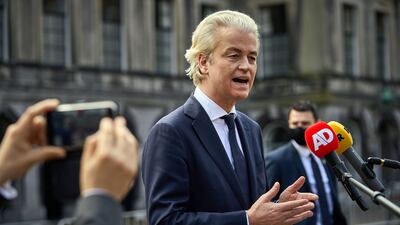The discrimination conviction of far-right politician Geert Wilders has been upheld by the Dutch Supreme Court.
Wilders, known for his anti-Islamic rhetoric, was convicted of insulting Moroccans as a group in 2014.
He called the trial politically motivated and demanded a retrial of his case after an appeals court last year upheld his conviction. No prison sentence or fine was imposed.
The Supreme Court on Tuesday said his remarks were “unnecessarily hurtful” and crossed the boundaries of free speech.
"The conviction of the suspect, Mr Wilders, remains in place," supreme court judge Vincent van den Brink said.
"With that statement he offended an entire group of people... in this case because of their descent. The fact that he spoke as a politician, who must have the freedom to raise matters of general concern, even if they are disturbing or hurtful, does not make this any different."
"Politicians too must adhere to the basic principles of the rule of law and not incite intolerance," Judge Van den Brink added.
After the Supreme Court ruling, Wilders said he was the victim of a “witch hunt” and a broken legal system.
“They want to shut me up but I will never be silent," he said.
Wilders was convicted of insulting Moroccans as a group at a campaign rally, when he led supporters in asking whether they wanted more or fewer Moroccans in the country.
“Fewer! Fewer! Fewer!” his supporters chanted. “We're going to take care of that,” Wilders told them.
Wilders, 57, is one of Europe's most prominent far-right leaders and has been a leading figure in shaping the immigration debate in the Netherlands over the past decade, although he has never been in government.
His Freedom Party (PVV) is the third largest in the Dutch Parliament and remained the main opposition party at general elections in March.


